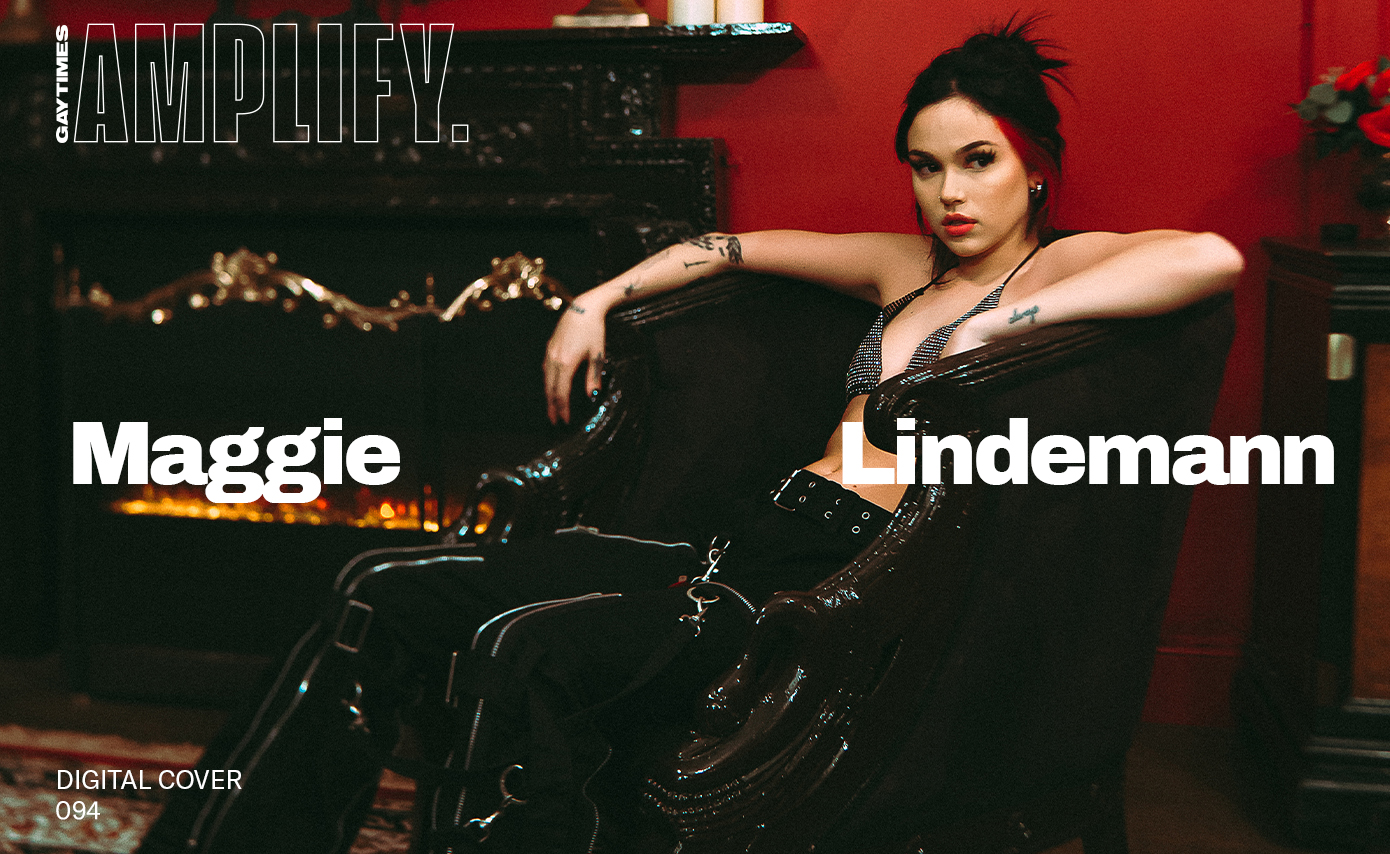
If you were only half listening, Maggie Lindemann’s 2017 breakthrough single Pretty Girl might have sounded like a typical tropical house bop. Slickly remixed by DJ trio Cheat Codes, it seemed precision-tooled for beach bars and Love Island montages. But if you were paying attention, Pretty Girl had a powerful message: don’t judge this book by its cover. “If I drink, if I smoke, I keep up with the guys,” Lindemann sang on the chorus. “Fuck your ribbons and your pearls – ‘Cause I’m not just a pretty girl.” Then again, Lindemann fans already knew she could be bold: a year earlier, she had come out as bisexual in a “super-emotional and totally spontaneous” social media livestream.
Now 22, Lindemann has just dropped her debut EP, Paranoia, a rocky affair which sounds nothing like Pretty Girl but does contain some equally striking lyrics. The chugging grunge banger Knife Under My Pillow was inspired by a time when Lindemann felt so unsafe in her own home that she really did keep a knife under her pillow. She calls Gaslight!, a savage collaboration with up-and-coming artist Siiickbrain, “a big fuck off” to a manipulative ex. And standout track Loner offers a melancholy celebration of outsiderdom. “Yeah, I’m a loner and I like it that way,” Lindemann sings on the chorus. “I like a dark room, with nobody but pain.”
Speaking on the phone from her LA home, Lindemann says that despite having “some pretty dark and sad lyrics”, the EP isn’t a downer. “It also has some really fun production so you can dance and go crazy to it, which is cool,” she says. Still, Paranoia definitely introduces a more alternative-sounding Lindemann to the singer we met on Pretty Girl. “Like, it’s still pop, but with more rock and punk elements now,” she adds.
Lindemann, who grew up in Texas before moving to LA to pursue her music career at 16, says this isn’t so much a reinvention as a return to her roots. “You know, I listened to a lot of hip-hop growing up,” she says. “My dad listens to alternative radio, my mom loves metal and harder rock music and my brother’s into classic rock. My whole family is very rock-oriented, so it felt very natural for me to do this. It felt more natural than making [straight-up] pop music.”
Given how huge Pretty Girl was – it cracked the UK top ten, and racked up 730 million Spotify streams – it must have been tempting to continue down the tropical house route. After all, record labels love nothing more than an artist who’s willing to replicate a winning formula. “I mean, after Pretty Girl, I released the song Obsessed, which was kind of similar,” Lindemann concedes. “I love Obsessed – I think it’s a great song. But after that, I was like: ‘This is fun, but I’m not really having fun. I like these songs, but I’m not really enjoying performing them.’ I just felt like I wanted to do something different because I wasn’t completely happy with what I was doing.”
Lindemann admits this was a risk she didn’t take lightly. “It was definitely hard to move lanes because no one really understood where I was coming from,” she says. “At the time I was a teenage girl and it was like: ‘We want you to make pop music.’ And it was also hard because I’d had this big song, so I had to decide: ‘Do I want to risk coming out with different music that might not work, or do I want to keep doing what I’m doing, knowing it will probably do well?’ But honestly, the risk was worth it because I literally love the music I’m making now.”
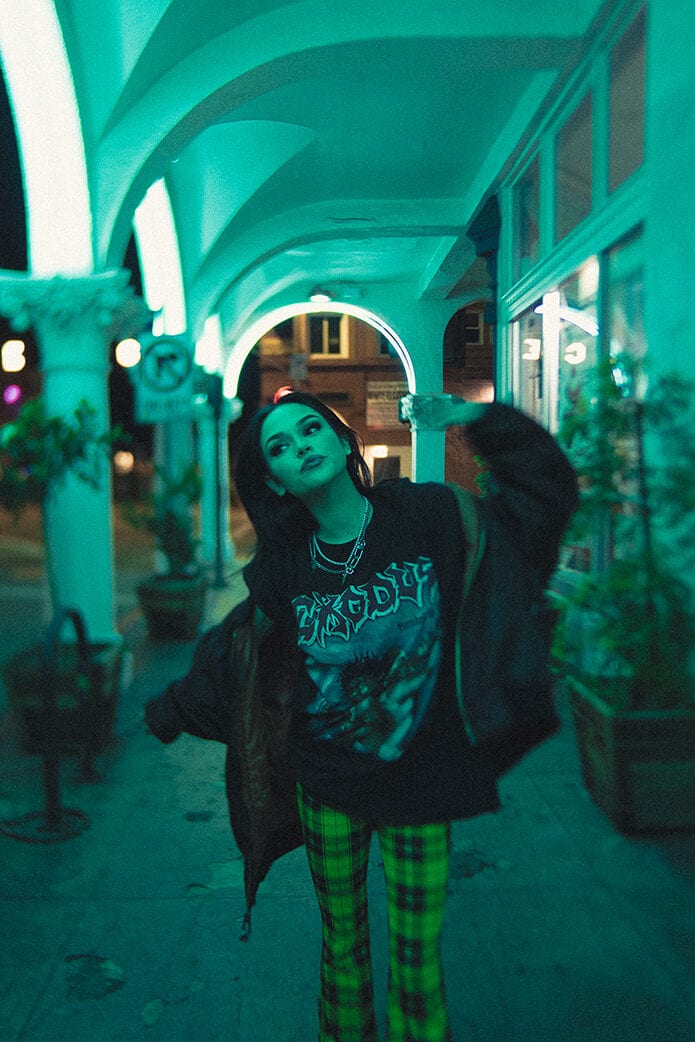
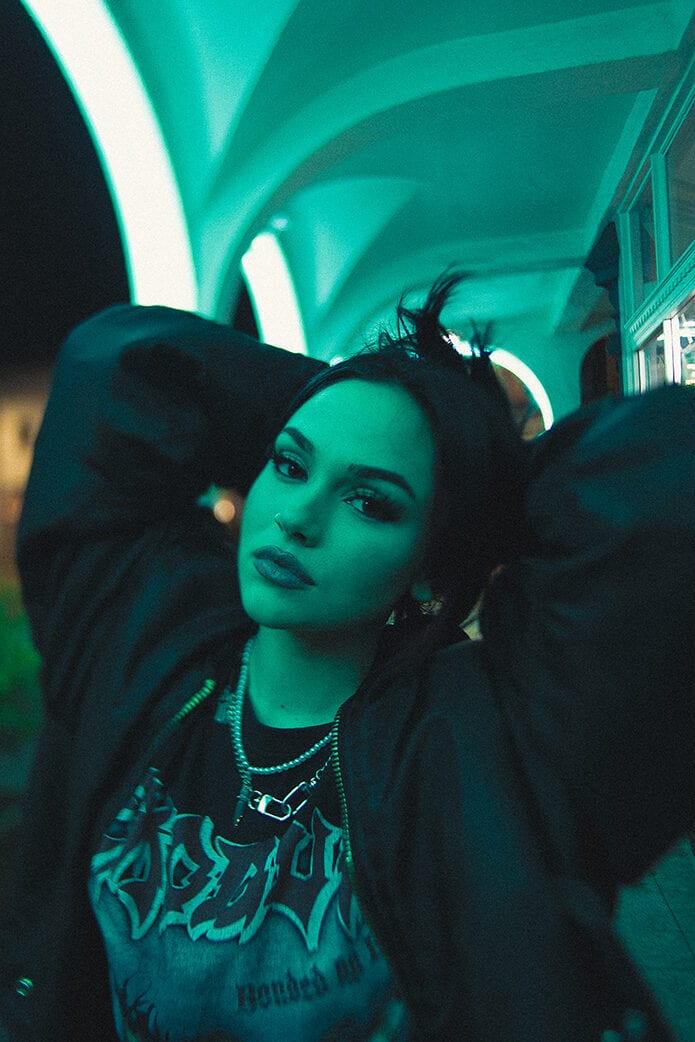
Lindemann speaks passionately about her new music and clearly relishes being able to follow her creative instincts. Another standout track from the EP, Scissorhands, was inspired by Tim Burton’s cult 1990 movie Edward Scissorhands. Lindemann says this haunting gothic fantasy about an unfinished humanoid creature left with scissors for hands has always touched her. “Obviously it’s such a visually pleasing film, but I really love the story,” she says. “This guy who’s obviously different is taken from his home and forced to live in this perfect world where he doesn’t fit in, and everyone acts like they’re surprised! I’ve always felt like I needed to write a song kind of based on that feeling.”
Some film fans view Edward Scissorhands as a queer parable because the title character is a clear outsider in a somewhat stifling suburban world. Does Lindemann agree? “I never even thought about that,” she says after a pause. “But like I was saying, it’s a movie about being different and not fitting into a world that’s seemingly perfect. It’s about being put in a world where you just don’t belong and feel like you’re out of place. So yeah, that [interpretation] definitely works for me.”
When you delve into Lindemann’s backstory, it’s easy to see why she relates to Edward Scissorhands. She’s spoken in the past about being bullied at high school, where she felt as though she never really fit in. “People just didn’t like me and I was just very to myself,” she said on the Teenager Therapy podcast last year. “I was too out there I think – my whole childhood, even in elementary school, I was just really hyper. I got diagnosed with ADHD when I was really young. I was too much for people. I think I just established that [reputation] really on, and from then on people were like: ‘She’s really annoying, we don’t like this girl.'”
Lindemann’s salvation was social media, where she became a near-instant hit. “I started getting a big following on Instagram and Tumblr and Keek when I was like 14,” she recalls today. “But I think I went on social media way too early. I shouldn’t have been on Twitter and Tumblr when I was 14, 15, 16 because back then, it was so toxic. I mean, it still is – but it’s a different kind of toxic now. The stuff I was being fed [online] at such a young age, I didn’t need to see. I definitely shouldn’t have been living on the internet at such a young age.”
What toxic ideas was she exposed to? “Oh, Tumblr was just so full of negativity back then,” Lindemann says. “There were all these pages for ‘thinspo’ and self-harm – really dark stuff. And people weren’t as informed about the internet back then so they didn’t realise all this stuff was out there. It’s better now: if you go on TikTok, you’ll see a trigger warning for anything kind of vulgar. You’d never have seen a trigger warning on Tumblr back in the day.” Still, Lindemann admits her internet experience has brought long-lasting benefits. “I’ve been on it so long that I know how to navigate it now,” she says. “And I’ve met so many cool people through the internet that I’m still friends with today.”
For many of us, getting to a thousand followers on Instagram feels like an achievement, but Lindemann amassed millions as a teenager. With faultless modesty, she says the secret to her success was simply being prolific. “Honestly, when I look back at the pictures I used to post, they were so cringe and I truly do not know why people would have wanted to follow me,” she says. “I think it was just about me being engaged – I was super-active and constantly posting. But my Instagram following definitely picked up when I started posting more music. That’s when I hit a million [followers] and really started to pop off.”
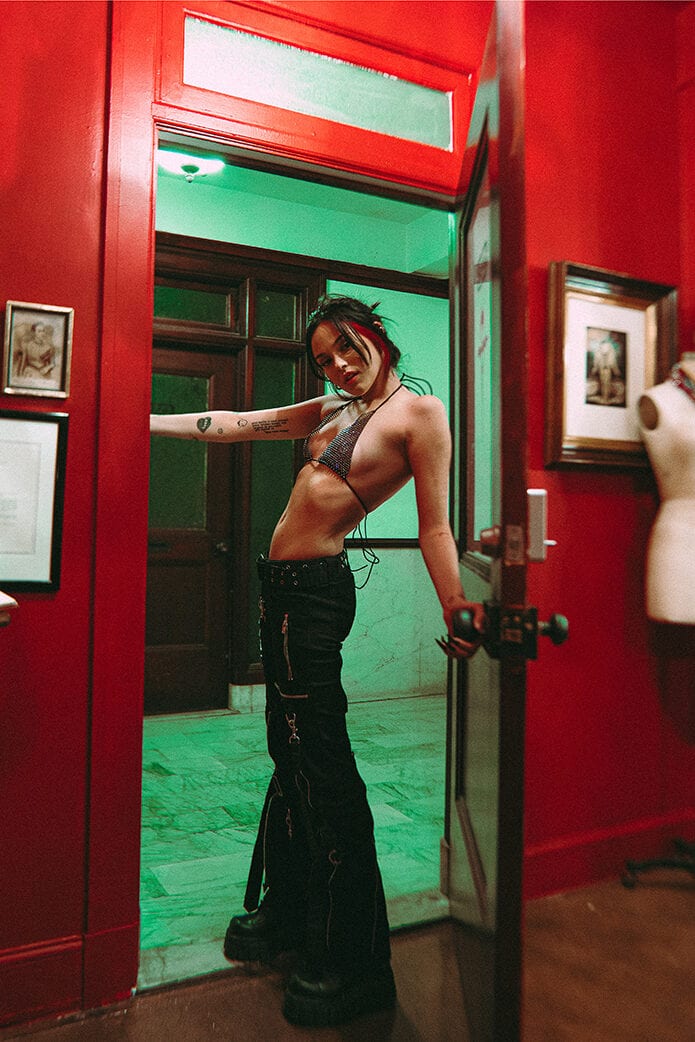
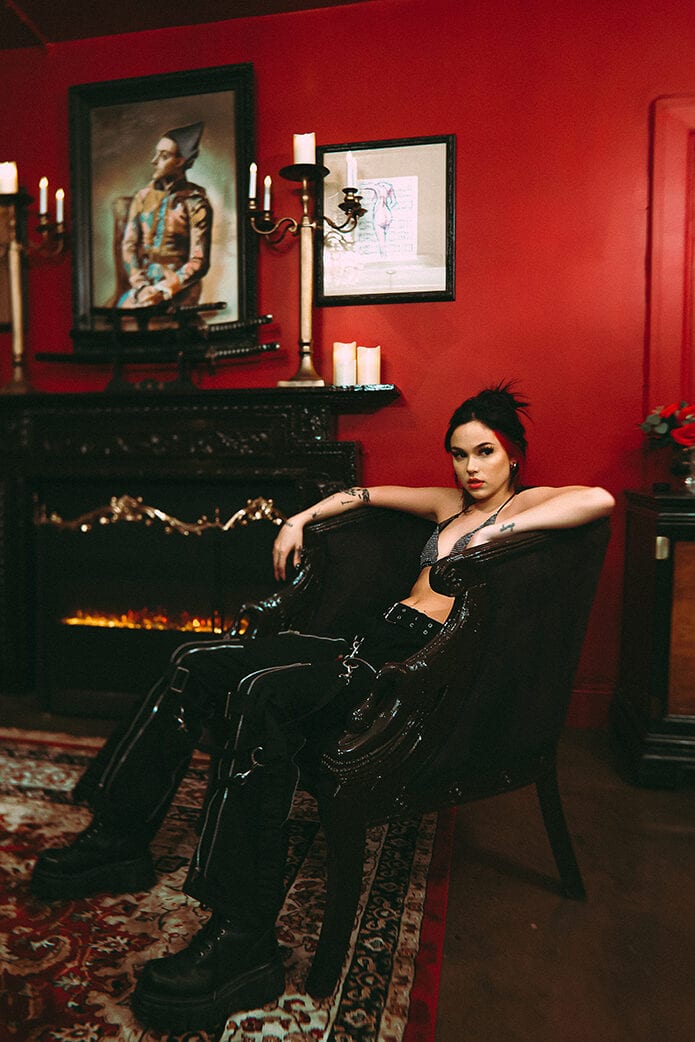
Lindemann says she did feel “nervous” that the stigma surrounding social media might dent her credibility, but points out that she’s always used her accounts to showcase her music. “Sometimes if you start on social media, people say: ‘You’re just a social media person – like, you’re not a real musician,'” she says. “But when I started doing social media, I was posting videos of me singing on Keek. I was never just posting photos. I’ve always been a singer; it’s just that I did it on social media first. That’s the modern world we live in: you do social media to get famous for whatever you want to do.” She says it’s “unfortunate” that some people still look down on social media, but predicts that in time it will be regarded as a “totally valid way to get to where you want to be”.
Social media isn’t just the bedrock on which Lindemann has built her music career. It’s also the vehicle she used to come out as bisexual in 2016. Today, Lindemann says her decision to discuss her sexuality on live-streaming app Periscope was actually pretty impulsive. “There was honestly no thought process,” she says with a self-deprecating laugh. “I was at the studio that day and I saw this pillow with a rainbow on it. It had something like ‘be yourself’ on it. I had just turned 18 and I remember thinking, ‘You know what, I’m going to come out. I’m just sick of hiding it.'”
At the time, “literally no one knew” she was bi. So after texting her friends and family to tell them she was about to come out online – “I didn’t even call my parents, I just put it in our WhatsApp group!” – Lindemann went live on Periscope. “And I literally started crying as soon as I went on,” she recalls. “Because any time I speak publicly about something I have feelings about, I end up crying because I’m that emotional a person. So that’s basically how it went. I literally hate that [Periscope] video now, because it’s like: ‘Why am I crying the whole time?’ But I didn’t want to write it out – I just wanted to go live and do it.”
After the livestream, some viewers accused Lindemann of being “extra” – a cruel and supremely cynical response to the deeply personal information she’d just shared. “That definitely hurt my feelings,” she says today. “I mean, of course, I’m being extra, I’m coming out! That’s a pretty monumental moment in people’s lives. But I’m the sort of person who goes, ‘Ow! That hurt me,’ and then… whatever. It hurt me for a minute and then I moved on. For the most part, people were really nice and supportive and I was really touched by the response.”
Though her parents proved to be “totally supportive”, Lindemann says it would have been harder to come out if she’d stayed in Texas. She spent most of her childhood in Dallas, but before she moved to LA, she spent a year with her family living in San Antonio: “a very small, country, Christian conservative town.” “I think the only reason I did it is because I moved to LA and I started feeling more comfortable with myself,” she says. “Back in San Antonio, there were some girls at my school who came out and started dating. Everyone was like, ‘Whoa, what?’ And I remember thinking: ‘They’re so brave. I can’t do that.'”
Happily, Lindemann says she’s “so much more comfortable” since coming out and isn’t fazed by the odd biphobic comment. “I have had people be like: ‘You have a boyfriend? I thought you were a lesbian,'” says Lindemann, who’s in a relationship with Brandon Arreaga from the boyband Pretty Much. “Do people really think that just because I have a boyfriend, I’m suddenly not bi any more? Oh, come on! But you know, I do think that for the most part, people understand.”
Given everything she’s achieved personally and professionally, with social media watching, does Lindemann feel like a role model now? “Um, I try to be, but I don’t know… I’ve made mistakes,” she says. “I definitely don’t want people to follow in all my footsteps! But I would like them to look upon me as a positive person. When I hear the name Ariana Grande, I think of all good things, and I’d like people to think of me in that way. I just want people to think I’m a genuine person, I guess.”